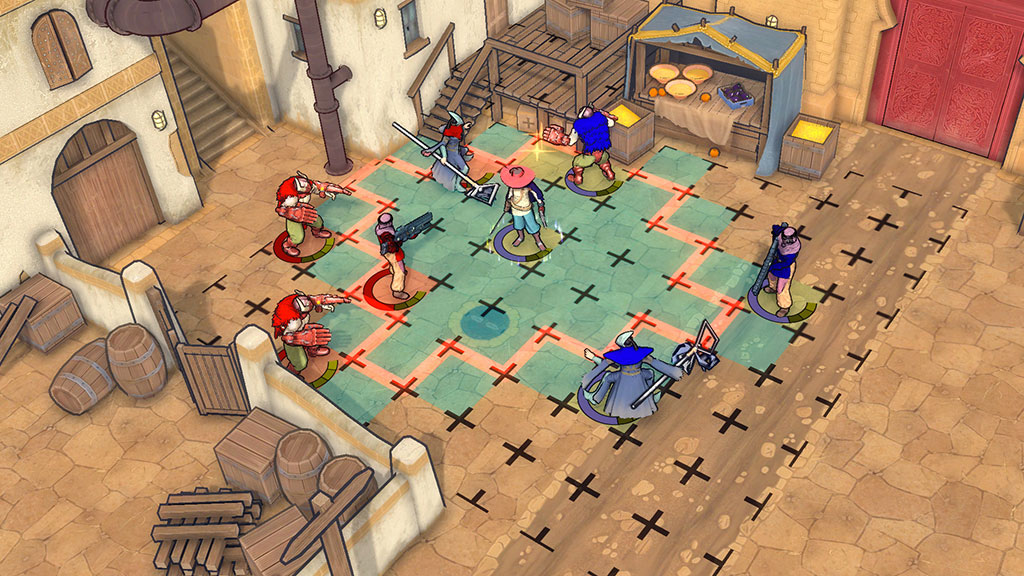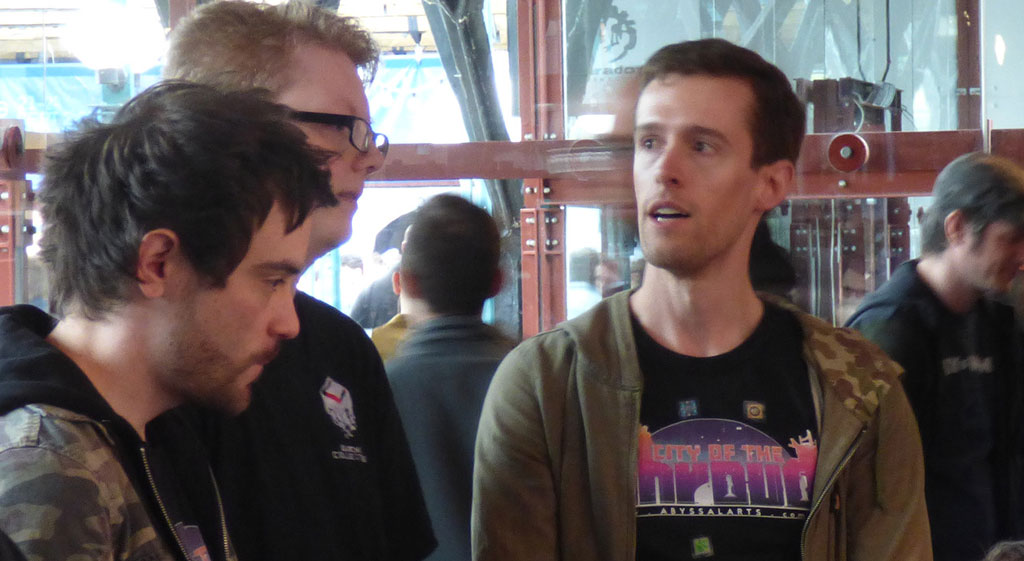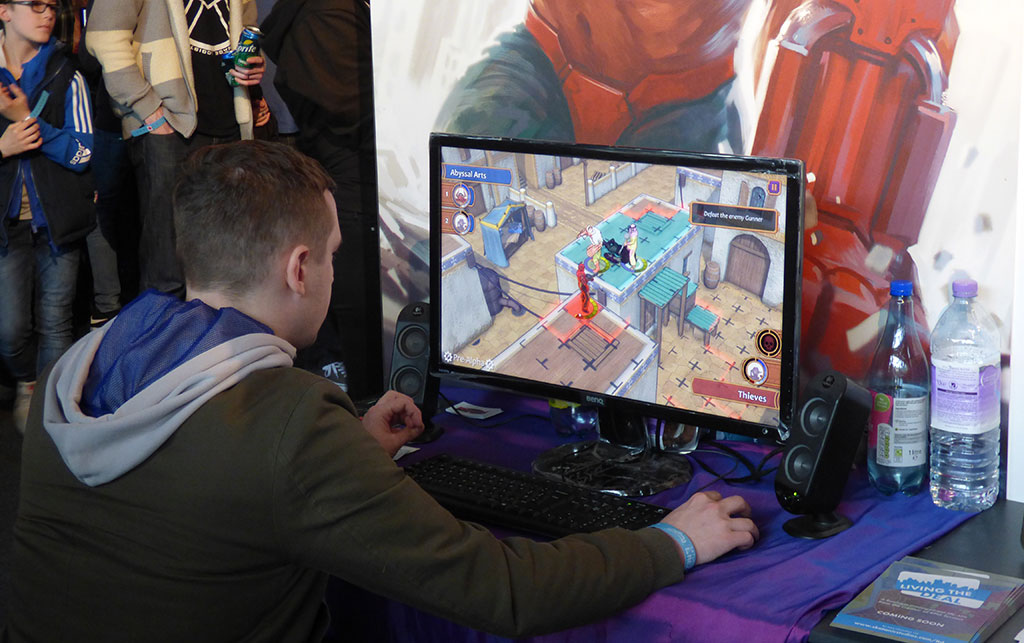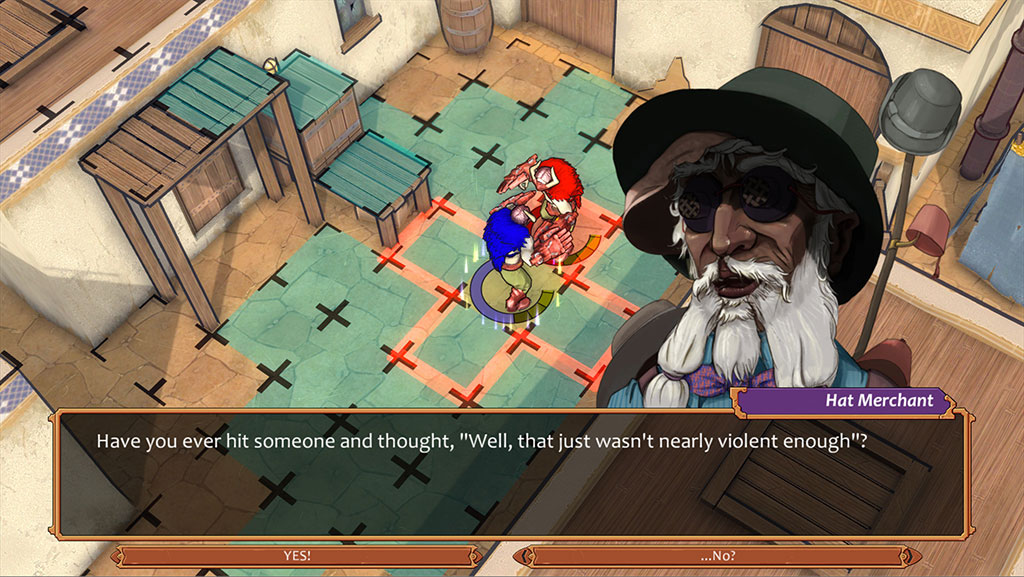Lifting the Veil on City of the Shroud
EGX Rezzed is one of my own highlights of the year and some really incredible games regularly come out of the shadows at the London festival. Last year we covered the Kickstarter for City of the Shroud. A game by industry veterans who wanted to introduce a new twist on the well worn RPG. A year later, and after a successful Kickstarter, we sat down with director of Abyssal Arts, Keaton White, and asked about Kickstarter, Game development, and being an indie.
For the uninitiated, what is City of the Shroud?
City the shroud is x-com meets Street Fighter. It's a real time tactical R.P.G. with fighting game mechanics. So it's a game where you're supposed to think on your feet and react to your opponent in real time. You read their moves, they read your moves, you build combos you chain moves together. That whole interaction is kind of what are they doing now, what am I doing now, and what is my situation going to be, is the driver of most of the strategy in the battle. It's a much faster more energetic approach to strategy combat.

City of the Shroud was funded on Kickstarter and very quickly. How did that feel?
The hard parts of Kickstarter are campaigning, so it was good we got funded in nine days. That was really nice and then we, obviously, used all of it on models and on animation like we said we would in the Kickstarter. We've just followed that up with our own money and we're finally at the point where we're getting ready to start preparing to deliver some of the higher end rewards. We've been rolling out updates and new builds and I'm really excited. We're on the cusp of being able to roll out something close to the final battle system to the backers and it just needs some visual animation so that people know what it is, instead of just like invisibility doing damage. When our Kickstarter was funded, and in such a short period, mainly it was relief. We felt, we can do this.
Did you expect it to be Kickstarted, in such a short time, and how do you feel about your goals now looking back?
I think that I felt like our funding goals were realistic, but I didn't think it would happen that quickly. I kind of expected to be fighting bitterly until the last day. Still, we we made sure to update every day and put out content, but when we hit that ninth day it was like, well now we can enjoy the rest of the Kickstarter. Kickstarter is still a lot of work but it was like trying to build the hype in awareness instead of worrying that what we were doing was or wasn’t going to succeed at all.

Why do you think you were able to meet the goal in such a short time frame?
It was definitely support from friends, family, and also people who knew about the game already and really wanted it to be a success. It was a small group of people, but it was still enough to push us over the threshold and we tried really hard to promote it. We also wanted to make sure that we timed it with a game show, so we basically did those things, then went to rest as soon as we launched it. I think the culmination of those things came together and it all just happened at once. Afterwards we tried to keep pushing forward and see if we could hit some of the stretch goals. That was very much about having a plan and steadily heading toward that plan.
I think Kickstarter is getting harder and harder. At this point you kind of have to have an existing base of people who already know something is happening and are really excited about it. The more people and the louder they are, the more likely you are to succeed and then that is connected to how much you're asking for. You can have a really enthusiastic, very tiny base and if you ask for too much, no matter how much you guys care, it's just not mathematically going to work out. If you are realistic then I think that you know it can happen and it will work. It's just hitting that balance and that is really so hard.
What's been the biggest hurdle you've had to overcome and the last year since the Kickstarter success and now?
Probably time. Getting the time to build everything, build it well and then polish it is a challenge. There's always something that comes up or something that needs your attention. There's always something to distract from what you really want to be doing, or what you really should be doing, or what you really have to do. It's just a constant battle of which thing absolutely needs attention right now. Whatever you choose there's going to be something that just has to wait and that's really frustrating. On the other hand, because we're doing this ourselves, I can afford to say, right that's just going to wait as we can't do that right now, but we're going to do it. We just put it on hold and when we can get to it, we get to it. Doing it yourself brings a whole different set of pressures.

How do those pressures vary from working in a large privately funded studio?
Well, there's always the pressure to get it out, because you're aware you have these people who have paid for it and you want to deliver. It's this pressure of getting it out the door to players and wanting them to play it. I want it to be done because I want to do it, but the same time I want to do it well and that ends up often taking more time. It’s difficult to balance those pressures and I tend to wait and do it well, over just doing it to get it done. Ultimately Miyamoto said a rushed game is forever bad, so do it right instead of doing it fast. On top of that you know there's the additional changes of the direct financial pressure and the need to come up for air once in awhile. You do things like EGX Rezzed because it's a huge morale boost. We come out and we've put all this effort in, we've made this boss fight, we've got all this stuff that's new, and people get to play it. When they respond well and tell us we're doing a good job, it keeps us going. It’s an awesome feeling and it's hugely encouraging.
Luckily, because of the way our team is set up and how we operate, there's minimal immediate financial pressure. There's not a do this or you're going to starve situation, which is good. It ties back into the choice of what we choose to do at what time. You can choose to do contract work and the money from that contract work will also go into the game, but I'm doing contract work, so therefore that's not working on the game. So, it pushes that out, but then you have some budget and you can pay for stuff for the game. It might double the amount of time to get something done as a result, but you are able to do it. Otherwise you just have no money and have no ability to do anything. It's almost like a survival game.
What is the biggest fundamental change to the game over the last year?
Broadly speaking I'd say player feedback or user experience. The U.I. is almost completely new. There are elements that are still there, but they've all been touched. So colors are different because people notice certain elements when they're a different color. The presentation of certain things is different or the layout is different. It’s small but it adds up. On top of that we've added tons of sound effects, tons of visual effects, and more animation. I think back in 2016 we only had two characters with a full animation set and everything else was placeholder. It didn't look as good as today. It was confusing, but now it's like you nail a heavy hit and there's a big sound effect and there's a big visual effect, the screen can shake, and you know that you've done something. Because some colors pop, more people are likely to just intuitively follow the combo wheel around. Because the color is red instead of blue in this section people will think ‘oh that's my A.P. meter and it's low’. It's becoming far more interpretive.
There's still work to be done, so we have sound effects in waiting and some visual tweaks in waiting to address player input on the combo wheel. As you add those things it all comes together and it starts to feel very much more like a complete game.
In the end, it’s still a case of issuing the same commands and enemy takes X damage, but the way it's presented to the player and how they interpret it is totally different. That, I think, is really where a lot of the magic lies.

Have you had to make many compromises to move the game forward?
Yeah, there are a few features that we've had to cut that we were thinking of. We never really talked about them publicly, so we figured no one will really miss them, but you know it was stuff that is technically possible. It would just add so much to the workload and it's one of those things. I would rather get the core done and completed well. I was reading something a while ago about how at the original Bastion had this entire gardening mechanic and weeks before the final game shipped they just cut the whole thing. We’ve had a couple of things like this. We had a system where you would be in the world and then something would happen. Then if you reacted to that it would somehow benefit your alliance, but then we realized that would mess with the balance of power as people could just sit there and wait for those things happen. It would inevitably benefit those players more than someone who maybe didn't have as much time to play the game. That didn’t make sense and we were like, wow, we do not have the time to do that anyway, so just moved on from it.
It's all the balance I suppose and that's one of the nice things about having a Kickstarter campaign and not being subservient to an organization. You’ve got some leeway and you can be transparent to give players the right game.
Would you kick start again?
I think I would. I would want to do it differently. I would prepare more and I would have a more finished game. You're asking for money to complete the game ideally, not using Kickstarter just to promote the fact that you have a game. If you were going to do it you'd go to backers with this thing and it would be very representative of what the final thing should be. Also, that makes it easier to show what the art looks like. It would be a question of balance. You have to ask how far you can go before we do that.
With Kickstarter you have an audience looking at the game and people who are posting feedback or sending in bugs. That is so valuable and so cool, and if you're just developing you don't get that. It can get kind of dreary just trudging along getting tasks done. There's not that feedback or interaction. So I think I would also try and find a game where we could be more involved with the players. Right now, because the game is a story focused, we can't just ruin a chapter for you. I don't want to do that but I feel like there could be a good way to be more interactive, and like I'd like to sit down and come up with a way to make that work. It's tiring and it's hard, but the rewards are really nice and I think that's great.

